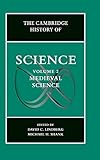The Cambridge Histroy of Science, Volume 2 - Medieval Science
Material type: TextPublication details: New York: Cambridge University Press, [c2013]ISBN: 9780521594486
TextPublication details: New York: Cambridge University Press, [c2013]ISBN: 9780521594486| Item type | Current library | Collection | Shelving location | Call number | Status | Notes | Date due | Barcode | Item holds |
|---|---|---|---|---|---|---|---|---|---|
 Book
Book
|
ICTS | General Sc | Rack No 3 | Q125 (Browse shelf (Opens below)) | Available | Billno:BANG/2013/CRB/4561; Billdate: 2014-01-23 | 00162 |
Browsing ICTS shelves, Shelving location: Rack No 3 Close shelf browser (Hides shelf browser)
Introduction
1 Islamic Culture and the Natural Sciences
2 Islamic Mathematics
3 The Mixed Mathematical Sciences
4 Islamic Astronomy
5 Medicine In Medieval Islam
6 Science in the Jewish Communities
7 Science In The Byzantine Empire
8 Schools and Universities in Medieval Latin Science
9 The Organization of Knowledge
10 Science And The Medieval Church
11 Natural Knowledge in the Early Middle Ages
12 Early-Medieval Cosmology, Astronomy, and Mathematics
13 Early-Medieval Medicine And Natural Science
14 Translation and Transmission of Greek and Islamic Science to Latin Christendom
15 The Twelfth- Century Renaissance
16 Medieval Alchemy
17 Change and Motion
18 Cosmology
19 Astronomy and Astrology
20 THE Science Of Light And Color, Seeing And Knowing
21 Mathematics
22 Logic
23 Geography
24 Medieval Natural History
25 Anatomy, Physiology, And Medical Theory
26 Medical Practice
27 Technology and Science
Index
This volume in the highly respected Cambridge History of Science series is devoted to the history of science in the Middle Ages from the North Atlantic to the Indus Valley. Medieval science was once universally dismissed as non-existent - and sometimes it still is. This volume reveals the diversity of goals, contexts and accomplishments in the study of nature during the Middle Ages. Organized by topic and culture, its essays by distinguished scholars offer the most comprehensive and up-to-date history of medieval science currently available. Intended to provide a balanced and inclusive treatment of the medieval world, contributors consider scientific learning and advancement in the cultures associated with the Arabic, Greek, Latin and Hebrew languages. Scientists, historians and other curious readers will all gain a new appreciation for the study of nature during an era that is often misunderstood.








There are no comments on this title.